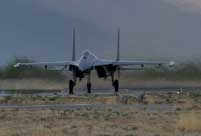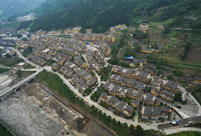 First overseas "China-standard" electric railway laid
First overseas "China-standard" electric railway laid
 College graduate launches organic agricultural cooperative in hometown
College graduate launches organic agricultural cooperative in hometown Guizhou Earthquake Emergency Rescue Team takes part in emergency exercises
Guizhou Earthquake Emergency Rescue Team takes part in emergency exercises Giant Spider-Man appears in Fuzhou
Giant Spider-Man appears in Fuzhou
 Beautiful Chinese-built roads in Africa
Beautiful Chinese-built roads in Africa Sagya Monastery in Tibet
Sagya Monastery in Tibet
 Young Chinese drive consumption
Young Chinese drive consumption
 The life of a model: Not as glamorous as it seems
The life of a model: Not as glamorous as it seems
 Hello Kitty, happy 40th birthday!
Hello Kitty, happy 40th birthday!
 The Western Qing Mausoleum
The Western Qing Mausoleum
CHANGCHUN, May 17 -- A trilateral agreement took effect Saturday to facilitate investment among China, Japan and the Republic of Korea (ROK).
The China-Japan-ROK agreement for promotion, facilitation and protection of investment, is widely believed by economists to be a prelude to the foundation of the free trade agreement (FTA) among the three countries.
"It will certainly give a major boost to the economic development of all three countries," said Li Tie, vice president of the China International Trade Association.
Foreign investment has played an irreplaceable role in boosting China's reform, opening up and economic growth in recent decades, he said. "It has an even larger role to play in years to come."
At the opening of the Summer Davos Forum last September, Chinese Premier Li Keqiang said China's external FDI was expected to reach 500 billion dollars in the coming five years. The figure is roughly equal to the total scale of the country's external FDI over the past 20 years.
The trilateral investment agreement will be particularly important to China's northeastern region, a rust belt that used to be China's heavy industry base, said Li.
"Jilin Province, for example, is home to more than 900 ROK-invested companies and 200 Japanese-funded businesses," he said. "It's time for the local governments to encourage these companies to expand investment under the framework of the new agreement."
Lack of foreign investment has to some extent aggravated the economic gap between China's interior and coastal regions.
"The northeastern provinces should open up wider to the outside world and take advantage of their geographical location to expand collaboration with Japanese and ROK businesses," said Zhang Huizhi, vice dean of Jilin University's Northeast Asian Studies College.
The trilateral agreement, the first of its kind, was signed in May 2012 after 13 rounds of negotiations.
It has 27 articles and a protocol to "create stable, favorable and transparent conditions for investment."
Negotiations for a much-expected FTA are still going on.
At last year's ninth China-Northeast Asia Expo, Hiromasa Yonekura, chairman of the Japan Business Federation, or Keidanren, said a "regional economic cooperation agreement" would be key to Japan's economic growth.
He said that the Keidanren was working with governments and economic circles for the conclusion of the China-Japan-ROK FTA and the founding of a regional comprehensive economic partnership (RCEP) in East Asia.
The proposed trilateral FTA would be a blessing for ROK businesses, with more opportunities, higher profits and lower tariffs, said Na Hee-Jong, director of the Overseas Sales Department of Samkwang Glass Co., LTD.
China's Ministry of Commerce said in March that the China-Japan-ROK FTA had undergone four rounds of negotiations over trade, investment and tariff cuts.
"There are still pending issues in areas concerning their respective interests," said Zhang Yushan, a Korean studies expert with the Jilin provincial academy of social sciences.
"China enjoys more advantages in agriculture and textile industries, while Japan and the ROK are stronger in the service sector. Detailed clauses are yet to be worked out concerning intellectual property rights, environmental protection, technical standards and government procurement."
Official statistics show the three countries' combined GDP totalled 15 trillion U.S. dollars last year, about 20 percent of the global total and 70 percent of Asia's total.
Meanwhile, the three countries are also among the world's biggest traders, with a combined foreign trade of over 5 trillion U.S. dollars, about 35 percent of the world's total.
 A bite of Jiang Nan
A bite of Jiang Nan PLA's tough exercises
PLA's tough exercises Best photos of the week
Best photos of the week  When we are young...
When we are young... Wedding photos of world champion
Wedding photos of world champion "The Most Beautiful Chinese Land"
"The Most Beautiful Chinese Land"  Men experience pains of childbirth on Mother's Day
Men experience pains of childbirth on Mother's Day  J-11 fighters training in complex meteorological conditions
J-11 fighters training in complex meteorological conditions Six years after Wenchuan earthquake
Six years after Wenchuan earthquake  8 great movies to watch with your mom
8 great movies to watch with your mom China's most luminous celebrities
China's most luminous celebrities Newly recruited police in Hetian hold drill
Newly recruited police in Hetian hold drill  Bird-men compete flying in Hong Kong
Bird-men compete flying in Hong Kong  The 'Chinese Dad'
The 'Chinese Dad' Shanghai locals bid farewell to childhood memories
Shanghai locals bid farewell to childhood memoriesDay|Week|Month